
The San Francisco Declaration on Research Assessment (DORA) was 10 years old on May 16, 2023.
To mark the occasion, we invited the worldwide community to join with us in organizing a week of events to examine both DORA’s impact on the reform of research assessment and the challenges that still lie ahead. The momentum for change is building across the globe, but we need to keep pushing together to achieve our goals!
Search and filter
Friday, 12 May 2023

Exploring best practices in research assessment: EMBO, EMBL and DORA
Heidelberg, Germany
12 May 15:00 (local time) / 12 May 13:00 (UTC) / Hybrid event
This interactive one-hour panel discussion will present and discuss funders', institutes' and publishers' initiatives to honour the DORA principles. The aim is to raise awareness of DORA and its impact on research assessment practices. The session will begin with a recount of the birth of DORA.
More information
The six panellists in this joint EMBO/EMBL session represent researchers in different roles: members of selection panels at funders' agencies and institutes, members of faculty boards and advisory committees, editors and publishers of scientific journals, and early career researchers. They will give examples of the DORA implementation at different institutions and reflect on their personal experiences participating in or implementing such initiatives. There will be space for questions from the audience.
The panel members are:
Karim Labib, MRC PPU, University of Dundee, UK
Guillermina Lopez, Instituto de Neurociencias, UMH-CSIC, Severo Ochoa Centre of Excellence, Spain
Bernd Pulverer, Head of EMBO Publications
Brenda Andrews, Donnelly Center, University of Toronto, Canada, editor-in-chief of Genetics Society of America’s G3 journal
Cecilia Perez, EMBL postdoctoral fellow
Wolfgang Huber, EMBL Group Leader and Senior Scientist
Moderator: Sandra Bendiscioli, Senior Policy Officer, EMBO
Hosted by EMBL and EMBO
Sunday, 14 May 2023
The DORA Movement in Canada: Working Together to Advance Assessment of Research Excellence
St. John's, Canada
14 May 13:00 (local time) / 14 May 15:30 (UTC) / In person event
This in-person half-day session at the Canadian Conference on Research Administration will provide an introduction to DORA in an internationalized context, lightning updates from funding agencies and postsecondary institutions, and opportunities for discussion with attendees about key questions.
More information
The DORA movement is evolving in Canada. 44 Canadian organizations have signed, including postsecondary institutions, research institutes, and all major funders. What does this mean for researchers across disciplines and career stages, for funders, for the public, for research administrators?
This half-day interactive session is designed to raise awareness of what DORA is and what it means for assessing research excellence, provide updates on the implementation of DORA into organizational and funding practices in Canada, and enable opportunities for discussion and idea generation among all participants.
Speakers:
• Stephanie Warner, Manager, Knowledge Engagement, University of Calgary
• Vincent Larivière, Canada Research Chair on the Transformations of Scholarly Communication, Université de Montréal
• Katelyn Landon, Senior Advisor, Science Policy Branch, Canadian Institutes of Health Research (CIHR/IRSC)
• Tony Michel, Senior Advisor, Social Sciences and Humanities Research Council (SSHRC/CRSH)
• Valerie Harbour, Deputy Director, Research Grants, Natural Sciences and Engineering Research Council (NSERC/CRSNG)
• Michael O'Neill, Director, Policy and Strategic Engagement, Canada Foundation for Innovation
• Eddy Nason, Director, Strategic Impact and Evaluation, Genome Canada
Bilingual | Bilingue
No virtual option available.
Hosted by Canadian Association of Research Administrators
Monday, 15 May 2023

Dora at 10: Revisiting the San Francisco Declaration on Research Assessment
Liège, Belgium
15 May 09:30 (local time) / 15 May 07:30 (UTC) / In person event
This event will provide an introduction to DORA and the CoARA agreement (Coalition for Advancing Research Assessment). Both talks will focus on how these initiatives can help in promoting and implementing more responsible research evaluation practices at the institutional level.
NOTE: This event is only available for members of University of Liège - the registration link refers to an intranet page.
More information
The University of Liège has included the evaluation of research and researchers into its Human Resources Strategy for Research (HRS4R) action plan. On the occasion of the 10th anniversary of the San Francisco Declaration on Research Assessment (DORA), ULiège will be revisiting these more responsible research evaluation practices on May 15th.
More specifically, this half-day in-person event will provide an introduction to the Declaration of Researsch Assessment (DORA) and the CoARA agreement (Coalition for Advancing Research Assessment). Both talks will focus on how these initiatives can help in promoting and implementing more responsible research evaluation practices in an institutional context and beyond, while providing opportunities for discussion with attendees.
Program
- 9h30 - 10h00 : Presentation of DORA, by Michel Moutschen, Vice-Rector for Research, and Florence Caeymaex, Advisor to the Rector for Ethics and Equality Policies, ULiège
- 10h00 - 10h30 : Presentation of the HRS4R label, by Véronique Larosa, Director of Research, ULiège RISE
- 10h30 - 11h00 : Coffee break
- 11h00 - 11h30 : Presentation of CoARA, by Stéphane Berghmans, Director of Research and Innovation, EUA (European University Association)
- 11h30 - 12h00 : Presentation " Impact factor and bibliodiversity ", by Marjorie Bardiau, Subject Librarian and Associate Professor and Christophe Dony, Subject Librarian and Lecturer, ULiège Library
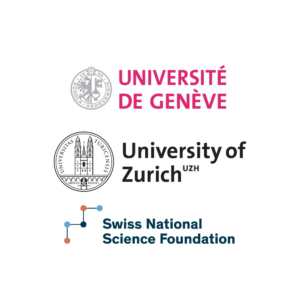
Reforming research assessment in an Open Science environment
Bern, Switzerland
15 May 09:45 (local time) / 15 May 07:45 (UTC) / In person event
This half-day event is the second in a series that looks at reforming research assessment in Switzerland. Kim Huijpen will present the Dutch national program on recognition and rewards «Room for everyone’s talent», to be followed by discussion and reflection on the Swiss context.
More information
The event is intended for professional staff as well as researchers in the Swiss research and higher education sector who are involved or interested in the areas of research(er) assessment, Open Science, equality, diversity, and inclusion (EDI), and related areas.
This is a public event, however places are limited and registration is required.
Organizers:
- Katrin Milzow and Isabel Bolliger, Strategy Division, SNSF
- Karin Gilland Lutz and Mihaela Falub, Office for Gender Equality and Diversity, UZH
- Katherine Hermans and Manuela Höfler, Open Science Office, UZH
- Danielle Bütschi, Open Science Coordination, Rectorate, UNIGE
Please see: https://www.universiteitenvannederland.nl/recognitionandrewards/wp-content/uploads/2019/11/Position-paper-Room-for-everyone%E2%80%99s-talent.pdf
Hosted by University of Zurich, University of Geneva, Swiss National Science Foundation

Ten years of DORA – evaluating what matters! and ‘The problem of evaluation: DORA the explorer at 10 and our paths into the future’
Derby, United Kingdom
15 May 10:00 (local time) / 15 May 10:00 (UTC) / Virtual event
Join us in our celebrations of DORA at 10 with this talk from two inspirational speakers, Professor Stephen Curry and Professor Cameron Neylon. In his talk, Professor Stephen Curry, Chair of the DORA Steering Committee, will discuss the origins of the declaration and the organisation behind it.
More information
Join us in our celebrations of DORA at 10 with this talk from two inspirational speakers, Professor Stephen Curry and Professor Cameron Neylon. In his talk, Professor Stephen Curry will discuss the origins of the declaration and the organisation behind it. While there have been many important developments over the past decade, and clear signs that change is happening and accelerating, there is still a need for DORA to make the case for research assessment reform and to participate in the development and testing of new and more robust practices in evaluating research and researchers. Cameron's talk, 'The problem of evaluation: DORA the explorer at 10 and our paths into the future' will cover the following: the role of evaluation in research remains vexed, whether of people, programs, departments, institutions or whole countries. The San Francisco Declaration on Research Assessment was an early sign of shifts away from a perceived status quo. But despite the success of DORA and other efforts to diversify research assessment there are still major challenges with our thinking on the how, and even the why of, of research evaluation. There is a tension between a desire for “objectivity” to deliver “fairness” and the very real differences between research programs that make it impossible to compare. Cameron will present recent results from his work on rethinking what “excellence” means in research, and place that in the context of the paths that DORA have laid out, looking forward to options for the future.
Hosted by University of Derby Library
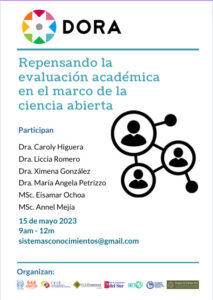
Repensando la evaluación académica en el marco de la ciencia abierta
Venezuela
15 May 09:00 (local time) / 15 May 13:00 (UTC) / Virtual event
Esta sesión, organizada en Venezuela, contará con un panel de reflexiones críticas sobre políticas de evaluación académicas nacionales, con el fin de construir colectivamente lineamientos para una evaluación académica justa y responsable en el marco de los principios de la declaratoria DORA.
More information
This session, organized from Venezuela, will feature a critical reflection panel on national academic evaluation policies, within the framework of the guiding principles of open science and the Dora declaration, for the collective construction of guidelines in favor of academic evaluation. fair and responsible.
In the panel, central elements and problems related to the theme will be raised.
The morning session will have the participation of Caroly Higuera, Unesco focal point for Open Science in Venezuela, who will present the main data and information available in Venezuela in terms of Open Science; Liccia Romero, who will address the issue of Open Science as a common good; Mariangela Petrizzo, who will address the specific issue of scientific evaluation from a gender perspective; Ximena Gonzalez Broquen, who will problematize the impact of the hegemonic system of scientific evaluation in the countries of the Global South, and Eisamar Ochoa and Annel Mejías, who will present the Declaration " In favor of a fair and responsible academic evaluation", carried out within the framework of the DORA project "Academic Evaluation Policies Applied in the CLACSO Centers Network in Venezuela"
Hosted by Centro de Estudio de Transformaciones Sociales del Instituto Venezolano de Investigaciones Científicas
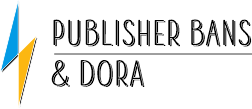
Publisher bans & DORA
Hamilton, Canada
15 May 10:00 (local time) / 15 May 14:00 (UTC) / Virtual event
Several publishers – particularly those specializing in open access journals – have rapidly increased the number of articles submitted to, and published by, their journals. But despite their popularity with researchers, some institutions are refusing to consider papers published in some journals for assessment purposes. This event will examine whether such bans are consistent with DORA and academic freedom.
More information
Some publishers – particularly those with many open access journals supported by article processing charges – have experienced enormous growth in the number of submissions from researchers, which suggests that they are meeting needs of the community and providing good value. But some institutions have told scientists that research in journals from certain publishers will no longer "count" for assessment. Such policies suggest that these may be "predatory" journals that do not perform the basic functions of academic journals. The publishers dispute this, as do many authors whose work appears in these titles. Many authors believe that choosing where to publishing their findings is part of their academic freedom. Blacklisting publishers with hundreds of journals may be too blunt an instrument for research assessment and inconsistent with DORA. Are there cases where such bans might be valid or useful to the community?
This event will be held as an online round-table discussion followed by a moderated Q & A session.
Hosted by Zen Faulkes
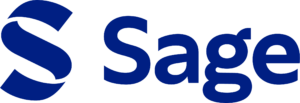
What should impact assessment look like for social science? Lessons learned from a decade of DORA
United States
15 May 12:00 (local time) / 15 May 16:00 (UTC) / Virtual event
This panel will engage representatives from social and behavioral science to discuss:
- What does impact assessment look like from their perch? What should it look like?
- How have their perspectives on impact changed over the last decade?
- What changes would they like to see?
- And more
More information
A decade ago, the San Francisco Declaration on Research Assessment, or DORA, tackled the pressing need to improve how funders, institutions, policy makers and others evaluated scientific research and its outputs. Existing measures, centered on scholarly citation, tended to use where the outputs were published as a proxy for the research’s quality, utility, and impact, measuring all disciplines with the same yardstick.
In the 10 years since, various efforts to improve assessment and measure societal impact have launched that downplay or even eliminate literature-based measurements. Ideas for these new measures focus on impact in the real world, address disciplinary differences such as those between social science and physical science, and offer useful tools for researchers and end-users alike.
This panel will engage representatives from social and behavioral science to discuss:
- What does impact assessment look like from their perch?
- What should it look like?
- How have their perspectives on impact changed over the last decade?
- What changes would they like to see 10 years from now?
- What necessary next steps should be taken – whether immediately practical or aspirational?
Speakers: Katie Corker (Grand Valley State University), Anna Harvey (SSRC), Anthony Michel (SSHRC), Cassidy Sugimoto (Georgia Institute of Technology)
Hosted by Sage Publishing
Tuesday, 16 May 2023

DORA at 10: A look at our history and the bright future of responsible research assessment (Asia-Pacific Plenary)
United States
15 May 20:00 (local time) / 16 May 00:00 (UTC) / Virtual event
As part of DORA's 10th Anniversary Celebration, we are holding two, 2-hour plenary sessions to capture as many time zones as possible and ensure opportunities for community participation worldwide. This is the information for the Asia-Pacific Plenary.
More information
During the plenary, we will discuss the state of the field, our past decade of work, and the future of DORA and responsible research assessment. Following introductory statements from DORA’s Vice-Chair, Ginny Barbour (Open Access Australasia), and a keynote address by Mai Har Sham (The Chinese University of Hong Kong), we will hold a panel discussion with experts from across the globe. Follow us @DORAssessment on Twitter to stay updated!
Hosted by DORA
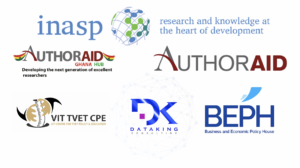
DORA@10, Artificial Intelligence with #ChatGPT and Research in the Global South
Accra, Ghana
16 May 12:00 (local time) / 16 May 12:00 (UTC) / Virtual event
This session organized by the research lab of Dataking Consulting together with AuthorAID Ghana Hub aims to discuss the use of emerging AI technologies, the ethical concerns and the broader metrics of DORA as well as what researchers in the Global South need to focus on.
More information
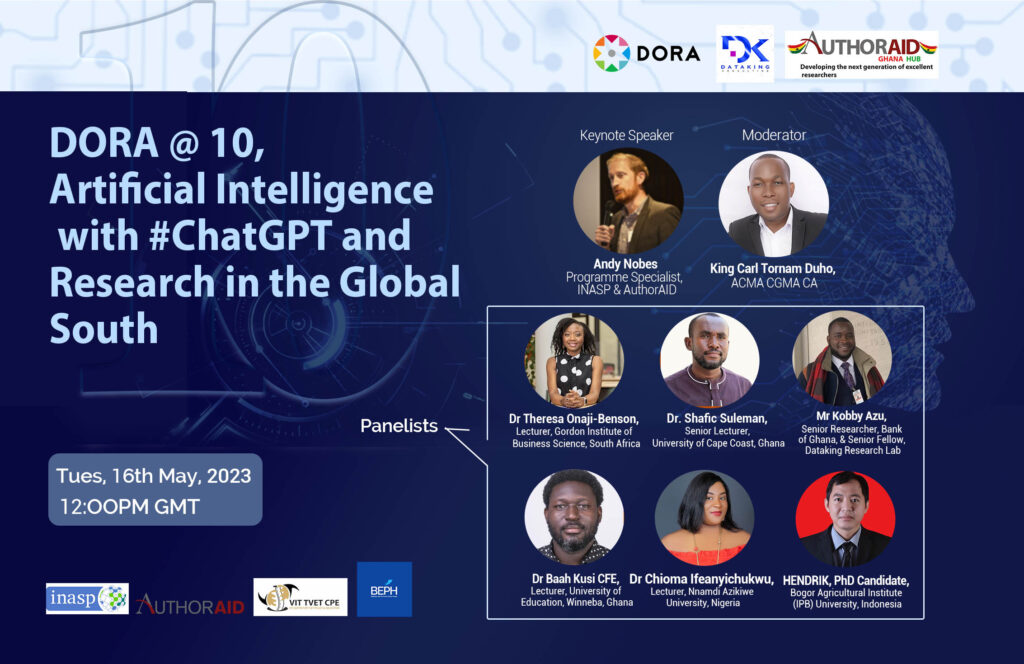
The Global South (GS) problems provide avenues for research that can provide new perspectives on the issues to inform policies in these countries, with some relevance to even the Global North (GN) countries (e.g. as learnt from the COVID-19 case).
The barriers to research in these countries could range from researcher-level barriers (i.e. insufficient mentorship, limited financial incentives and time constraints), institutional barriers (limited availability of resources, restrictive and poorly developed research infrastructures, weak collaboration and obstructive policies and procedures), structural barriers (political will, the politicization of research and political instability), external barriers (the nature and extent of GN activities and systems, allocation and distribution of funding and resources, characteristics and focus of GN-GS research collaborations, and publication and information dissemination challenges).
There have been concerns about whether with these barriers, researchers in these developing countries should be required to necessarily publish in elite journals to be recognized for promotion or to compete on the global stage. Debates have ensued about the fact that some research published in elite journals may not necessarily be impactful while there could be some articles from GS researchers in relatively lower-ranked journals which could on the individual paper base be more impactful than some individual articles in elite journals.
The emerging developments in technology and artificial intelligence specifically, provide some opportunities and threats to researchers with the need to focus on ethical considerations. Could AI help in the journal review processes, help in providing a publication impact assessment for research quality, or could the unregulated use of the new large language models (e.g. ChatGPT or Google BARD) create a threat to research quality?
As part of the 10th anniversary of the Declaration on Research Assessment (DORA) initiative which supports research quality on the basis of individual research and not just the quality of the journal that researchers published in, we wish to bring together academics, policy researchers, university administrators and the broader public to discuss:
- The state of research published in the Global South now; with a focus on issues of quality, open-access publication, the use of preprint outlets and patronage of predatory journals
- The role of the DORA initiative in research impact assessment and how the Global South researchers can benefit from it
- Concerns about the limitations of research readership by keeping articles behind paywalls and how research impact could go beyond academic citations to the usage of the findings by policymakers
- The risks and opportunities with the use of large language models (e.g. ChatGPT and Google BARD) in research generation and publication, touching on ethical and plagiarism issues which journal editorial teams need to consider
- How research in the Global South can be improved to compete at the global stage, by addressing the constraints, among other issues.
This session is sponsored by the AuthorAID Ghana Hub and the Dataking Research Lab of Dataking Consulting. This event will also benefit from the support of international organizations like the International Network for Advancing Science and Policy (INASP) and AuthorAID, UK, as well as GS-focused institutions like the VIT Centre for TVET Policy and Education, as well as, the Business and Economic Policy House.
Keynote Speaker
Andy Nobes, Programme Specialist, INASP & AuthorAID
Panellists
Dr Theresa Onaji-Benson, Lecturer, Gordon Institute of Business Science, South Africa
Dr. Shafic Suleman, Senior Lecturer, University of Cape Coast, Ghana
Mr Kobby Azu, Senior Researcher, Bank of Ghana, & Senior Fellow, Dataking Research Lab
Dr Baah Kusi, Lecturer, University of Education, Winneba, Ghana
Dr Chioma Ifeanyichukwu, Lecturer, Nnamdi Azikiwe University, Nigeria
HENDRIK, PhD Candidate, Bogor Agricultural Institute (IPB) University, Indonesia
Moderator
King Carl Tornam Duho, ACMA CGMA CA
Hosted by Dataking Consulting, AuthorAID Ghana Hub
- Contact the organizer: https://www.authoraid.info/en/community/ghana-hub/ and https://datakingconsulting.com/

DORA at 10: A look at our history and the bright future of responsible research assessment (Africa, Americas, Europe Plenary)
United States
16 May 08:00 (local time) / 16 May 12:00 (UTC) / Virtual event
As part of DORA's 10th Anniversary Celebration, we are holding two, 2-hour plenary sessions to capture as many time zones as possible and ensure opportunities for community participation worldwide. This is the information for the Africa, Americas, and Europe Plenary.
More information
During the plenary, we will discuss the state of the field, our past decade of work, and the future of DORA and responsible research assessment. Following introductory statements from DORA’s Chair, Stephen Curry (Imperial College London) and a keynote address by Sarah de Rijcke (Leiden University), we will hold a panel discussion with experts from across the globe. Follow us @DORAssessment on Twitter to stay updated!
Hosted by DORA
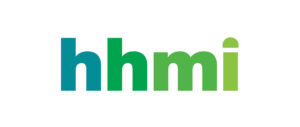
De-emphasizing journal name in researcher assessment at HHMI
United States
16 May 11:00 (local time) / 16 May 15:00 (UTC) / Virtual event
Minimizing the influence of journal-based indicators in researcher assessment requires a culture shift in how science is valued by organizations. HHMI will provide an update on the work the Institute is doing to diminish the influence of publisher prestige in assessment.
More information
A landmark research study is important because of the findings it produced—not because of the journal where it was published. To change what is valued in research and reduce the importance of journal reputation, organizations need to implement policy changes.
Join the Howard Hughes Medical Institute (HHMI) for an update on the steps we are taking to disentangle journal reputation from researcher assessment. Participants will learn about the progress that has been made so far, our plans for the future, and why we believe it is important to lead by example.
The evolving relationship between scholarly communication and researcher assessment will also be discussed, including the ways that scholar-led publishing practices, such as posting preprints, can reinforce responsible assessment.
The event will take place as a webinar with presentations that will be followed by a moderated Q&A session. All those who are interested in improving the ways that researchers are assessed are invited to register.
Speakers:
• Leslie Vosshall, PhD
Vice President and Chief Scientific Officer
• Bodo Stern, PhD
Chief of Strategic Initiatives
• Anna Hatch, PhD
Program Officer, Scientific Strategy
Hosted by HHMI
Wednesday, 17 May 2023
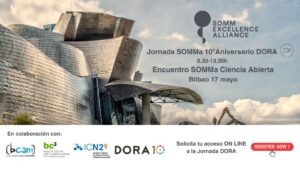
Encuentro SOMMa de ciencia abierta
Bilbao, Spain
17 May 09:30 (local time) / 17 May 07:30 (UTC) / Hybrid event
SOMMa, la alianza de los centros y unidades reconocidos por la AEI con las distinciones Severo Ochoa y María de Maeztu, respectivamente, organiza un evento de sus grupos de trabajo de gestores y de ciencia abierta. El encuentro se celebra en Bilbao, los días 16 y 17 de mayo, siendo el 17 de mayo la jornada dedicada a ciencia abierta.
More information
Como parte del encuentro del grupo de ciencia abierta, SOMMa celebra el 10º aniversario de la declaración de DORA, con la siguiente agenda:
- 9:30 - 9:45 Bienvenida
-
María José Sanz, presidenta de SOMMa
-
Fernando Cossío, director científico de IKERBASQUE
-
-
9:45 - 10:30 Presentación de CoARA
-
-
Eva Mendez - miembro de CoARA Steering Board
-
-
10:30 - 11:00 El papel de las agencias de calidad en la reforma de la evaluación de la investigación
-
Pilar Paneque - directora ANECA
-
-
11:30 - 13:30 Mesa redonda - “La reforma de la evaluación de la ciencia y su impacto en la atracción y retención de talento”
-
-
Eva Mendez - miembro de CoARA Steering Board
-
Ismael Ràfols - Centre for Science and Technology Studies (CWTS), Leiden University, NL, Science Policy Research Unit (SPRU), University of Sussex, UK
-
Pilar Rico - jefa de la Unidad de Acceso Abierto FECYT
-
Fernando Orejas - experto área TIC
-
Fernando Cossío – director científico IKERBASQUE
-
El evento es híbrido para los miembros de SOMMa y está abierto a la participación online para el resto de la comunidad científica.
Evento organizado por Núria Benítez (nuria.benitez@icn2.cat) y Miguel A. Benítez (mbenitez@bcamath.org), coordinadores del grupo de trabajo.
Con el apoyo de SOMMa, ICN2 y BCAM, que es a su vez la entidad anfitriona.
Hosted by BCAM
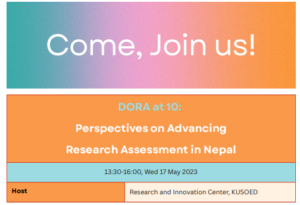
DORA at 10: Perspectives on Advancing Research Assessment in Nepal
Lalitpur, Nepal
17 May 15:00 (local time) / 17 May 09:15 (UTC) / In person event
Come, join us! Discuss research assessment in Nepal with a futuristic orientation on creating an alternative framework!
More information
In a much aware world of academic assessment (for hiring, promotion and grants), the use of metrics for research assessment has significantly reduced. However, the opposite appears to be the case in Nepal, including for the UGC’s research assessment policies and different university’s hiring and promotion criteria, where indexing and impact factors still remain a prevalent tool (in fact, the misuse of such metrics has been institutionalized) in evaluating researchers. Recently, some researchers have started talking of the impact factor game and are seeking better way to assess scientific outputs. As such, against the policy structures and processes, the voice on alternative ways for more constructive and meaningful measures of research assessment are somehow overshadowed in the Nepali context – which appears to be so in the South Asian context as a whole. In this context, it is timely to spark a discourse on how we can better evaluate the outputs of scientific research. How long do we rely on the use of proxy measures? Isn’t it time for us to rethink existing research assessment policies and practices and to create a framework for driving institutional change in terms of how we judge research? Centering on these questions, we intend to discuss our experiences and perspectives on research assessment in Nepal with a futuristic orientation on creating an alternative framework for research assessment.
Hosted by Research and Innovation Center at Kathmandu University School of Education (KUSOED)

To Rank, Not to Rank, or To Rank Responsibly?
Turkey
17 May 14:00 (local time) / 17 May 11:00 (UTC) / Virtual event
This seminar aims to draw attention to the persistent popularity of rankings, despite attempts such as the Declaration on Research Assessment (DORA) to address methodological and conceptual mistakes in these rankings.
More information
Currently, the process of evaluating academic performance has become increasingly synonymous with rankings, resulting in constant rankings of researchers, journals, articles, universities, and academic departments. The focus is primarily on obtaining a position on these lists, regardless of the criteria used for ranking. Unfortunately, this trend is seriously damaging to the academic community, as it contradicts the critical culture that should prevail in academia.
The upcoming seminar aims to draw attention to the persistent popularity of rankings, despite attempts such as the Declaration on Research Assessment (DORA) to address methodological and conceptual mistakes in these rankings. The seminar will also explore the normalization of manipulation in these rankings and provide concrete examples of the harm they inflict on the academic community.
The Scholarly Communication Network is a recently established network that caters to the needs of early career researchers. The network's primary objective is to provide a platform for these researchers to connect and collaborate, given the challenges they face in the current academic and economic climate. For further details on the network's mission and activities, interested parties can visit their website at https://schcommnetwork.com/.
Hosted by Scholarly Communication Network
Third research colloquium of the Autonomous University of Queretaro
Querétaro, Mexico
17 May 09:00 (local time) / 17 May 14:00 (UTC) / In person event
The main objective of the event is to share the social impacts of research projects financed by the Autonomous University of Querétaro since 2020. Besides, the Rector of the University is going to publicly sign the San Francisco Declaration on Research Assessment.
More information
The main objective of the event is to share the social impacts of research projects financed by the Autonomous University of Querétaro since 2020. For that purpose five projects coming from the Natural and Social sciences are going to be selected using as criteria their capacity to provide evidence of social impact.
Besides, the Rector of the University is going to publicly sign the San Francisco Declaration on Research Assessment. After that, a World Cafe is going to be facilitated to discuss how to develop better scientific evaluation policies within the Autonomous University of Queretaro.
Hosted by Autonomous University of Querétaro
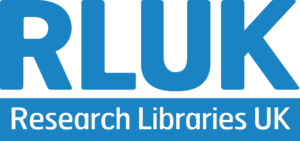
Bridging the Gap: Exploring Innovative Opportunities for Research Libraries to Reform Research Assessment
London, United Kingdom
17 May 14:00 (local time) / 17 May 14:00 (UTC) / Virtual event
Research Library UK (RLUK)'s Open Strategy Network (OSN) will deliver a workshop to reflect on the role of libraries in implementing DORA and to explore new and innovative opportunities for research libraries to reform research assessment and accelerate change.
More information
RLUK's Open Strategy Network (OSN) will join DORA's worldwide community to deliver a workshop to reflect on the role of libraries in implementing DORA and to explore new and innovative opportunities for research libraries to reform research assessment. It will build on existing work and identify new collective and individual activities which we can take to accelerate and support change.
This workshop will focus on how research libraries can bridge the gap between institutional commitments to DORA and practical support and engagement for researchers, and research culture (and metrics).
It will be framed by brief case studies from RLUK Libraries (Leeds, Leicester, Newcastle and Reading) who will share their experiences supporting DORA, challenging research assessment orthodoxy and transforming policies, for example:
The case studies will reflect on and highlight key lessons, strategies and advocacy activities to provide a catalyst for new opportunities and lead into breakout groups.
These breakout groups will be dynamic and creative spaces for exploring next steps, new skills and advocacy activities. The outputs from this workshop activities will help to further embed DORA, inform the delivery of RLUK's Strategy 2022-2025, in particular the Role of the Research Library and support change in the wider community.
Hosted by Research Libraries UK
How to write for non-academic audiences to achieve progress towards the UN Sustainable Development Goals (SDGs)
United States
17 May 12:00 (local time) / 17 May 16:00 (UTC) / Virtual event
A practical, hands-on workshop exploring how to make research more accessible to non academic audiences and how research assessment reform can support these efforts
Participants will have the opportunity to hear from a range of experts on how to write for non expert readers, with practical advice
More information
Driving progress towards the UN Sustainable Development Goals needs engagement and input from across all parts of society. Research and education helps us to understand, explore, and engage on key issues and to explore ways to address challenges we are facing across the globe. However, the outputs of research can be hard to understand and utilise for those who are not academic or expert. The broader reform of research assessment offers us an opportunity to incentivise communication modes and formats that drive greater public engagement, with plain language summaries and practitioner abstracts two formats that are helping more readers to engage with research to find answers to the world’s most pressing problems.
Join the Higher Education Sustainability Initiative SDG Publishers Compact Fellows, the Open Climate Campaign, and OpenPharma for a co-convened practical workshop which will offer advice and guidance on when and how to write for non academic audiences.
For the best experience we recommend that registrants join the event live but we appreciate that this won’t always be possible. All registrants will receive a follow up after the event including slides and resources.
Hosted by HESI SDG Publishers Compact Fellows
Thursday, 18 May 2023
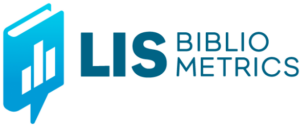
Why I signed DORA
United Kingdom
18 May 14:00 (local time) / 18 May 13:00 (UTC) / Virtual event
Over 20,000 individuals have signed DORA, but we often focus more on the 2,735 organisations who have done so.
In this open discussion researchers and research supporters discuss why they signed the Declaration in a personal capacity - what it means to them today, and why they hope others will too
More information
A diverse group of researchers from different disciplines and at different career stages discuss why they signed DORA from a personal perspective. They are joined by others working in research support such as librarians or research assessment specialists.
The aim is to have a free-form, open conversation that focuses on personal values rather than organisational strategy. We will cover questions such as ‘would you still sign DORA today?’ ‘What does DORA mean to you?’ ‘What has DORA achieved’?
The event is organised by Liam Bullingham and Nicola Wylie from the LIS-Bibliometrics Committee, a global group of practitioners who seek to support their organisations in providing responsible bibliometric and research evaluation services.
Hosted by Liam Bullingham (Bullingl@edgehill.ac.uk) and Nicola Wylie
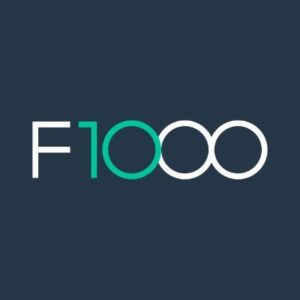
What can open research values bring to research assessment reform?
United Kingdom
18 May 14:00 (local time) / 18 May 14:00 (UTC) / Virtual event
The vision of many in the future research assessment environment has much in common with the principles of open research. This webinar will consider the requirements of research assessment today and discuss how open research can support greater inclusivity and responsible research assessment.
More information
10 years since the launch of F1000 and the founding of DORA, we invite you to join our upcoming webinar and consider the future of responsible research assessment.
The vision articulated by many in the future research assessment environment has much in common with the underlying principles of open research. This webinar will consider the requirements of research assessment today and discuss the opportunities presented by open research publishing to help support greater inclusivity and responsible research assessment.
Our speakers will ask and consider:
• How do we assess research impact today – what has changed since the DORA declaration?
• What can open research practices contribute to future research assessment systems?
• What can publishers do to support responsible research assessment?
• What are the great examples of innovation that we can draw upon to help shape research assessment systems?
F1000 and Taylor and Francis are signatories to DORA, and welcome submissions to the new Innovations in Research Assessment Collection on F1000Research: https://f1000research.com/collections/innovations-in-research-assessment/about-this-collection.
Hosted by F1000
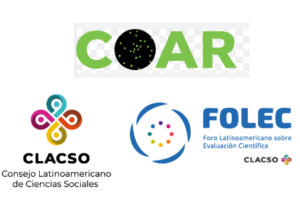
Potentialities of Open Access Repositories for inclusive, diverse and equitable research assessment in LAC
San José, Costa Rica
18 May 15:30 (local time) / 18 May 20:30 (UTC) / Hybrid event
The roundtable will focus on the ways open access repositories can contribute to more inclusive, diverse, and equitable research assessment in Latin American and the Caribbean, through an overview of different strategic innovations and alternatives to improve research assessment processes.
More information
Latin America and the Caribbean (LAC) stands out for its approach to knowledge as a public and common good and for the extended adoption of open access in academic and scientific journals, managed by the academic community as a non-profit good. Early national and institutional regulations give priority to open access repositories and more recently, to open research data and other components of open science. Yet, research assessment systems face different obstacles and challenges to reflect, recognize and reward diverse research knowledge, in their own languages, its wider dissemination and social and community outreach.
The roundtable focuses on the ways open access repositories can contribute to more inclusive, diverse, and equitable research assessment processes in LAC. In the frame of DORA´s 10 Anniversary and as part of COAR Annual Meeting 2023 to be held in Costa Rica, jointly organized with Consejo Nacional de Rectores (CONARE) and LA Referencia, this event supported by CLACSO-FOLEC seeks to strengthen the present and future research assessment through a more virtuous articulation with the scientific and knowledge information held in the distributed network of LAC repositories.
Participants:
- Marin Dacos, France
- Laura Rovelli, CLACSO-FOLEC
- Rodolfo Barrere, RICYT/Observatorio CTS OEI
- Lautaro Matas, COAR Notify, Executive and Technical Director, La Referencia
- Moderator: Kathleen Shearer, Executive Director, COAR
Event in English and Spanish, simultaneous translation.
Hosted by Confederation of Open Access Repositories (COAR); CLACSO-FOLEC
Friday, 19 May 2023
China’s Science and Technology Evaluation Reform: DORA & Breaking the Siwei
Beijing, China
19 May 09:00 (local time) / 19 May 01:00 (UTC) / Hybrid event
This seminar will invite scholars and management personnel from S&T management and evaluation to jointly discuss the reform and development of China's S&T evaluation, aiming to provide new knowledge for China's S&T evaluation reform, and provide Chinese practice and experience for DORA.
More information
This session is in Chinese.
Since 2018, China has issued a series of S&T evaluation reform documents, which is known as “breaking Siwei”. The purpose is to correct the problem of excessive quantitative evaluation orientation, which is consistent with DORA's reform philosophy. As one of the tenth anniversary commemorative activities of DORA, the STME Special Committee of the CASSSP organized this seminar, which invites scientists, scholars and practitioners of S&T evaluation from advantageous universities and research institutions to jointly discuss new methods, good practices and cases after the new round of S&T evaluation reform in China, especially talents evaluation. This seminar is expected to let Chinese scholars learn more about DORA, as well as provide Chinese wisdom for DORA's ongoing global research on S&T talent evaluation. The main reporters and attendees include:
- Li Xiaoxuan, Director of the STME Special Committee of CASSSP, and Executive Committee of DORA;
- Zhou Hui, Vice President of Shenzhen University
- Liu Yun, Vice President and Professor of School of Public Administration, UCAS
- Wu Jian, Secretary of AMSS, CAS
- Meng Wei, Dean and Professor of the School of Public Management at East China Normal University
- Gong Xu, Researcher at the NSFC
- Zhang Bin, researcher of the Strategic Assessment Consulting Center of Academy of Military Sciences
- Yang Jian'an, Researcher at the Research and Development Center of the MOE
- Tian Delu, Researcher at NCSTE, MOST
- Dai Qing, researcher of the NCNT, CAS
Hosted by STME Special Committee of the CASSSP,China
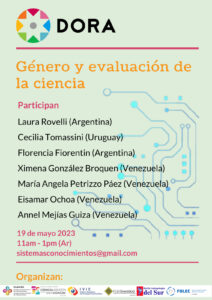
Género y evaluación de la ciencia
Argentina
19 May 11:00 (local time) / 19 May 14:00 (UTC) / Virtual event
El “Género y evaluación de la ciencia” tendrá como temática la evaluación académica de las carreras y de la investigación desde una perspectiva crítica de género, problematizando cómo se dan esos procesos en varios países, para visualizar problemáticas y proponer líneas centrales de reflexión que ap
More information
Este panel sobre “Género y evaluación de la ciencia” tendrá como meta enlazar la temática del género en la ciencia, enfocándonos en la temática específica de la evaluación académica de las carreras y de la investigación desde una perspectiva crítica de género. Para eso conversaremos desde las perspectivas concretas de cómo se dan esos procesos en varios países de Nuestramérica, para visualizar las problemáticas centrales y proponer líneas centrales de reflexión que apunten a transformar la realidad. Contara con las presentaciones de:
- Laura Rovelli (Argentina/FOLEC): Incentivos a la equidad de género desde la reforma de la evaluación académica;
- Ximena Gonzalez Broquen, Maria Angel Petrizzo/Annel Mejias/ Eisamar Ochoa (Venezuela/CETS IVIC, REDAS, FIS Diversidad y GT Clacso “Ciencia abierta como bien común": Apuntes sobre Género y evaluación científica en la Red de centros clacso Venezuela;
- Cecilia Tomassini Cecilia Tomassini, Profesora Adjunta, Unidad Académica de la Comisión Sectorial de Investigación Científica (CSIC) Universidad de la República, UDELAR. : ¿Cómo afecta la maternidad y la paternidad las trayectorias académicas? Evidencias a partir del caso de Urugua;
- Florencia Fiorentin Florencia Fiorentin (Argentina/CONICET-Instituto de Industria, Universidad Nacional de General Sarmiento): El efecto Matilda en la política científica y tecnológica. Brechas de género en la asignación en los Proyectos de Investigación Científica y Tecnológica (PICT) en Argentina
Hosted by FOLEC/CLACSO, Centro de Estudio de Trasnformaciones Sociales/ IVIC, Red de Antropologías del Sur, FIS Diversidad y GT CLACSO “Ciencia abierta como bien común"
